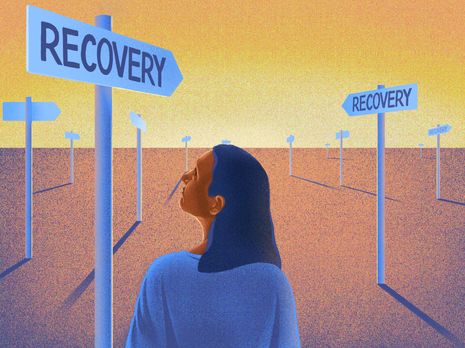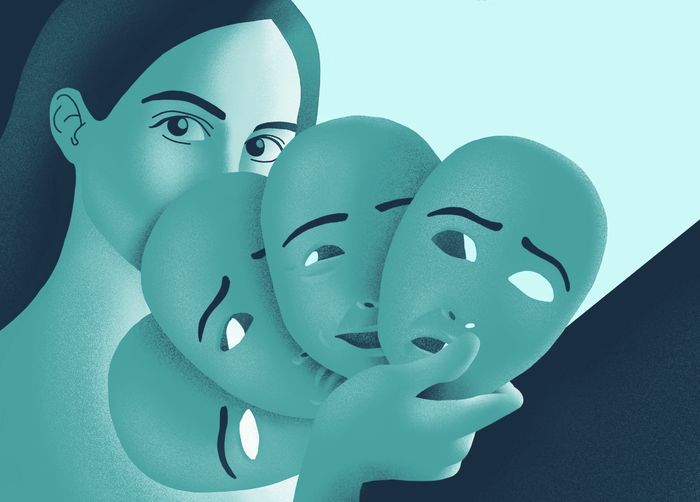Redefining Recovery
“Recovery, with a distinct end-goal, is not only an incongruous notion but an unhealthy one”: sharing her experience of therapy, Gaby Vides writes on how her aim to be ‘cured’ inhibited the process

Content Note: this article contains discussion of anxiety and eating disorders
‘Recovery is not linear’. A phrase I never really understood in the first few months of my eating disorder-anxiety cocktail. I was insistent that I would ‘recover’. My perfectionism engulfed me with obsessive fantasies of a future where I was completely anxiety-free.
Of course, it was delusional to believe that recovery would be this smooth trajectory with no wobbles or setbacks. Striving towards a finish line, where I’d be given a medal by my therapist for ‘recovering’, was in itself inhibiting my meaningful recovery. Recovery, with a distinct end-goal, is not only an incongruous notion but an unhealthy one. The fixation on ‘recovery’ and returning to my previous normality fuelled my anxiety; whenever I was anxious, I felt resigned to an inescapable life of tumultuous fear. My generalised anxiety disorder could not comprehend ‘recovery’ beyond these absolutes of failure and success.
“The fixation on ‘recovery’ and returning to my previous normality fuelled my anxiety”
I remember the moment I felt my anxiety truly begin. I woke up at 1 am on an early April morning during my last year of school and I thought I was dying. My heart was squeezing in on itself and my breath was short. The most terrifying noticeable sign of anxiety was the deep pit in my chest which felt like someone was pulling me inwards.
This feeling did not stop for 10 days. Of course, it ebbed and peaked but the underlying fear of dying continued and, worst of all, the crippling fear of anxiety itself remained constant.
I was exhausted. Having struggled with an eating disorder for the last few months, I blamed my eating for allowing this anxious hole to open up within me. I bizarrely missed the self-harm of not eating, feeling my anxiety was simply the outcome of actually feeding myself. Only now I can appreciate that bulimia was simply the match that lit my anxious flame.
My first months of therapy were largely focused on my eating and I found my therapist rather annoying. I had been referred to her for my bulimia and she seemed to misunderstand my anxiety. Telling me to count slowly to 5 and focus on smells and textures, I couldn’t understand how she as a licensed therapist thought I simply needed to ‘calm down’. As if drinking chamomile tea would magically wash away my debilitating anxiety which felt at the time like it was chewing me alive and then spitting me out again.
“I thought once my exams were over the anxiety would dissipate, but I was wrong”
I completed my A levels. They had caused me streams of sleepless nights as I panicked about letting myself and my family down, missing my Cambridge offer and by virtue ruining my life - these spirals of worry were not uncommon for me with every tiny error or fear transforming into a life-or-death dichotomy. Naively, I thought once my exams were over the anxiety would dissipate, but I was wrong. The days after my exams were some of my most anxious, dazes of lying on the floor crying; the illusion I was sold that ‘it’s just because you go to a stressful girl’s school’ was shattered.
While my friends went to beer gardens, pubs and house parties, I just tried to get through the long summer days. There were days I struggled to speak and most days I didn’t even want too. But half-way through the summer I changed therapist. One of the biggest lessons I have learnt over the last year is that it is rare you will match with your first therapist and while uncomfortable, changing therapist is a critical part of recovering.
The second time around I knew I had found the right person. My current therapist is a CBT therapist and specifically seeks to challenge my inner thoughts. Whereas my previous therapist prescribed comforting and soothing words, this therapist makes me confront the worst-case scenarios of my worries. I must stress CBT is not for everyone but I knew if I wanted to get to Cambridge in October I had to do something intense and exhausting. I often came home from therapy sessions extremely anxious but a few days after I could recognise that my latest worry was just that: a worry, not a prophecy.
My final session before leaving for University was by far my toughest experience of therapy: my therapist wanted to film herself and I having a series of conversations as if it were freshers week. With my heart palpitating, I sat in her office and struggled with mock ‘get-to-know-you’ conversations through my cracked voice and tears. I tried to convince her that I wouldn’t be able to ‘do’ University and she continued to ask me ‘what’s the worst that can happen?’
Somehow I managed to make it to Cambridge and I surprised myself by loving it. Yes, there was a night in freshers week I just stayed in my room and watched Netflix because the thought of a pub crawl was too stressful. Yes, there are still days where I struggle to speak and hall is too overwhelming and nights out where I have to leave the club early. But now, instead of these anxious hours and days signalling failure, I have learnt to accept them as part of my recovery.
“Instead of these anxious hours and days signalling failure, I have learnt to accept them as part of my recovery”
My anxiety is still a large feature of my life but it’s not as much of a shaping feature as it was last year. My lack of control over other people and the future scares me less now and I’m learning to realise that a small mistake or flaw isn’t a testament of my entire character and shouldn’t change my sense of self. Therapy has also taught me there is no pressure to never be anxious, as there is no singular moment my anxiety will disappear. The goal of my recovery is not for me to be anxiety-free - this is unrealistic - it is to manage my anxiety and learn to live with the anxious parts of me.
Recovery is messy. Recovery is having a panic attack after not being anxious for a few days, simply because you couldn’t open the cream cheese container. Recovery is being socially anxious but not internalising the self-deprecating thoughts about your relationships. Recovery is your mental health moving up and down, forwards and backwards, sideways and diagonal but knowing throughout it all you will be okay. Recovery is recognising you will always be recovering.
Most of all recovery is not prescribed - there is no one perfect way to ‘recover’ and for me, this knowledge was the beginning of my own recovery.
 News / Caius mourns its tree-mendous loss23 December 2025
News / Caius mourns its tree-mendous loss23 December 2025 Comment / Yes, I’m brown – but I have more important things to say22 December 2025
Comment / Yes, I’m brown – but I have more important things to say22 December 2025 News / Cambridge welcomes UK rejoining the Erasmus scheme20 December 2025
News / Cambridge welcomes UK rejoining the Erasmus scheme20 December 2025 News / CUP announces funding scheme for under-represented academics19 December 2025
News / CUP announces funding scheme for under-represented academics19 December 2025 News / King appoints Peterhouse chaplain to Westminster Abbey22 December 2025
News / King appoints Peterhouse chaplain to Westminster Abbey22 December 2025









